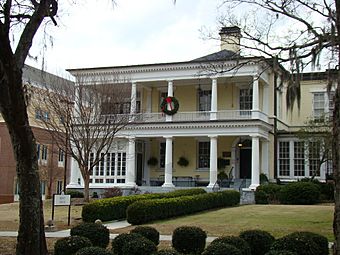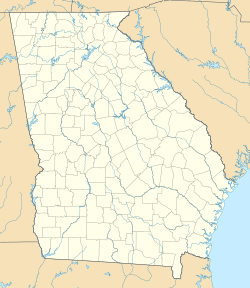Stephen Vincent Benét House facts for kids
|
Stephen Vincent Benet House
|
|
 |
|
| Location | 2500 Walton Way, Augusta, Georgia |
|---|---|
| Area | 64 acres (26 ha) |
| Architectural style | Federal |
| NRHP reference No. | 71000286 |
Quick facts for kids Significant dates |
|
| Added to NRHP | November 11, 1971 |
| Designated NHL | November 11, 1971 |
The Stephen Vincent Benét House, often called the Benét House, is a very old and important building. It stands on the Summerville campus of Augusta University in Augusta, Georgia. This house was built between 1827 and 1829. It was first known as the Commandant's House of the Augusta Arsenal.
The house is a great example of Federal style architecture, though it has been changed over the years. It became a National Historic Landmark in 1971. This is because of its connection to Stephen Vincent Benét (1898–1943). He was a famous writer who won a Pulitzer Prize. Stephen Benét lived in this house during the 1910s. Today, the Benét House is home to the Summerville campus's office of admissions.
Contents
Exploring the Benét House and Its Past
The Benét House is right in the middle of the Summerville campus. It is one of several buildings that used to be part of the Augusta Arsenal. The house is a two-story building made of brick. It has a special design where the main entrance is on one side. A two-story porch wraps around the front and one side of the house.
The House's Design and Changes Over Time
Inside the Benét House, you can see parts from different times in its history. The outside of the building has also been changed and added to many times. These changes show how the house has been used and updated over nearly 200 years.
A Look at the Augusta Arsenal's History
The house was built from 1827 to 1829. This happened after the United States government decided to move the Augusta Arsenal to this new spot. The arsenal was a very important place for storing weapons and supplies. It played a big role in the American Civil War. During that war, the Confederate Army used the arsenal. It was also important during the Spanish–American War.
Stephen Vincent Benét's Connection to the House
In 1911, Colonel J. Walker Benét became the commandant of the arsenal. He moved into the house with his son, Stephen. Stephen Benét lived here until 1915. This house is where he started his writing journey. It is also the most important building still standing that is linked to his life.
Stephen Benét is famous for many of his writings. One of his most well-known works is the long poem John Brown's Body, which he wrote in 1928. He won the Pulitzer Prize for this poem in 1929. He also wrote a popular short story in 1937 called "The Devil and Daniel Webster".
 | Roy Wilkins |
 | John Lewis |
 | Linda Carol Brown |



